Quick summary: you want 400+ mg of Mg (of the Element, not the compound)
Magnesium is essential for you to get the benefits of Vitamin D - Vitamin D consumes Magnesium
Having 400+ of Mg as a single dose causes a laxative effect in many people,
Taking 2 or more times per day greatly reduces the laxative effect.
Just as you do not consume all of your water or food for the day at one time,
you should not consume all of your Magnesium for the day at one time
Excesive food, water, Magnesium, etc. is too hard on the gut.
Controversy as to which form of Magnesium is is best
Probably liquid forms:
Pico Magnesium or Magnesium Chloride have good bioavailability and low laxative effect.
Table of contents
- Updates
- Magnesium 101
- What's The RIGHT Magnesium Dosage For Optimal Health? by Kerri Knox at Easy Immune System Health
- Great summary by "Ms Magnesium" (Dr. C Dean) March 2015
- Decrease in Magnesium during the past century
- Consumer Labs Review of Magnesium - as little as 2 cents per 200 mg of Mg
- Reasons for Magnesium Deficiency include
- Reasons for Magnesium Deficiency - from Metabolics.com
- Magnesium and Vitamin D - similarities and differences
- CLICK HERE for diseases which can be prevented/treated by Magnesium, Vitamin D, or BOTH
- Magnesium and Vitamin D are synergistic, that is, increasing one helps the other.(Oct 2011 table)
- Solving Obesity Magnesium (about 4 mg/pound of body weight)
- Nutritionist website: http://www.krispin.com/magnes.html which says maximum is 6.8mg /lb of body weight
- Magnesium web site:
- History of Magnesium - a consistent 400mg minimum RDA
- Strangely, the Upper Tolerable limit seems to be less than the RDA - UL is typically 2X to 10X the RDA
- Magnesium Requirements
- NLM effectiveness ratings for MAGNESIUM(with no comment on vitamin D)
- Vitamin D Council / Cannell Newsletter July 2009: Magnesium and Vitamin D's Co-factors
- Hot Flashes and Magnesium
- See also VitaminDWiki
- Nutrional Magnesium Org BLOG
- Mercola has many articles on Magnesium
- Natural News also has many articles on Magnesium
- Google Search for "Proton pump inhibitor" and Magnesium on the web > 1 million hits Feb 2012
- VitaminDWiki Low cost to get vitamin D cofactors - including Magnesium
- Clips from Linus Pauling on Magnesium - as of 2003
- Bioavailability of US commercial magnesium preparations - 2001
- Bioavailability and Pharmacokinetics of Magnesium - 2001
- A VitaminDWiki 1987 article on Magnesium included some recent reasons for deficiency
- Citrate good, Oxide not better than placebo - RCT 2003
- Mineral decrease from vegetables in the past century
- Magnesium in the diet
- British Analysis of Mineral Content for Vegetables
- US Govt study of Mineral Content for a century did not change much
- The Scientific Evidence of Mineral Deficiency in Food
- The Magnesium Miracle reviews on Amazon seem to provide good overview of the importance of the element
- My notes of the book Magnesium Miracle by C. Dean, 2007 which need to be confirmed
- Concerning vitamin D and Magnesium interaction from Internet:
- CLICK HERE for a forum discussion of Magnesium bioavailablity
- Magnesium L-Threonate perhaps more bioavailable Jan 2012 - wait and see
- (Magnesium Bioavailability - 2005)
- Spread the dose out over the day as needed to avoid laxative effect for some of the forms - such as citrate : 2, 3, 4 times
- The Magnesium Factor - another book
- Reuters June 2011Magnesium Deficiency Reduces Effectiveness of Vitamin D in the Prevention of Disease
- Most people are Magnesium Deficient
- Magnesium in water is associated with reduction in stroke
- Magnesium Chloride
- Magnesium Chloride mentioned at Vitamin D Council
- Magnesium online resource center
- Magnesium Interactions
- The only difference between chlorophyll and hemoglobin is that Magnesium is in the center instead of Iron
- Magnesium deficiency is associated with poor mental health
- Magnesium is one of the treatments for Restless Legs
- European upper limit for Magnesium was based on diarrhea
- 3,751 magnesium binding sites on human proteins GreenMedInfo Dec 2012
- See also web
- Chart shows 3 locations where low Magnesium decreases Vitamin D
- Magnesium may not be as available if have low stomach acid (seniors)
- Infographic by Ontario Health
- Magnesium test of your blood $49
- Magnesium Reduces Diabetes Risk by 53% Report on a 2013 study
- Much more heart disease if Calcium/Magnesium ratio is too high
- Notes on what needs to be changed here (May 2013)
- % Magnesium element in supplements
- Person running the Magnesium Deficiency Facebook page believed: no benefit to > 20 ng of vitamin D
Updates
not much difference in bioavailability

Magnesium 101
http://gotmag.org/magnesium-deficiency-101/ has following table of Sept 2014
Low magnesium and worse health problems
| Mild DailyChallenge | Greater DailyChallenge | Severe DailyChallenge | Life ThreateningChallenge
|
| Stage 1 | Stage 2 | Stage 3 | Stage 4
|
| Fatigue | Anxiety & panic attacks | Arteriosclerosis | Alcoholism
|
| Constipation | Arthritis | Blood clots | ALS (Lou Gehrigs disease)
|
| Dizziness (vertigo) | Asthma | Bowel disease | Alzheimers
|
Dysmenorrhea
(excessive menstrual pain) | Attention Deficit Disorder | Calcified mitral valve
(mitral valve prolapse) | Cancer (breast, colon, prostate)
|
| Facial twitches | Backache, upper back: excess cortisol | CFS/ME
(Chronic Fatigue Syndrome /
Myalgic Encephalomyelitis) | Cardiac afibrillation
|
Food cravings
(especially sugar, caffeine, simple carbs) | Backache, lower back: emotional | Celiac disease | Congestive heart failure
|
| Headaches | Cystitis | Cerebral palsy | Eclampsia
|
| Heart palpitations | Ear infections | Chronic kidney disease | Emphysema (COPD)
|
| Hiccups | Gluten sensitivity | Concussion | Myocardial infarction
|
| Hyperglycemia | Hyperlipidemia
(high cholesterol, triglycerides) | Depression | Obesity
|
| Hypoglycemia | Hypertension | Diabetes | Parkinsons disease
|
| Irritability | Insomnia | Epilepsy/seizures | Renal failure
|
| Loss of appetite | Insulin resistance
(pre-diabetes) | Endothelial dysfunction
(dysfunction of lining of blood vessels) | SIDS
|
| Mood swings | Migraines | Failure to thrive | Starvation
|
| Muscle cramps, spasms | Multiple pregnancies
(exacerbates Magnesium deficiency) | Heart arrhythmias | Stroke
|
| Nausea | Nerve problems | Hormonal imbalance | Sudden cardiac death
|
| Nervousness | Obesity | Hyperparathyroid | Ventricular fibrillation
|
| Poor memory / concentration | Osteopenia (precursor to osteoporosis) | Hypothyroid |
|
Pregnancy
(exacerbates Magnesium deficiency) | PMS | Kidney disease |
|
| Raynauds syndrome | Poor concentration | Liver disease |
|
| Weakness | Pre-diabetes; insulin resistance | Metabolic Syndrome |
|
| | Sinusitis | Miscarriage |
|
| | TMJ disorder | Mitral valve prolapse
(Calcified mitral valve) |
|
| | Weight gain
(especially on waist) | Multiple sclerosis |
|
| | | Obesity, severe |
|
| | | Osteoporosis | |
They also have a free booklet on Mg concerns which you can download
- Type as well as the amount - in forms of tablet, gell, bath flakes, etc. as well as time release
- Mentions Angstrom Magnesium - which apparently doe not cause bowel problems and can be taken sublingually
- has a very strong taste - probably need to mask it in fruit juice. Apparently also known as ionic magnesium
- CLICK HERE for suppliers of Angstrom Magnesium via Google Shopping
- Mentions an expensive ($39 for 8 ounce) transdermal Magnesium Gel which can be applied to the skin
- See also her page on Magnesium on VitaminDWiki
- - - - - - - - - - - - - - -
Great summary by "Ms Magnesium" (Dr. C Dean) March 2015
Magnesium: THE Ultimate Guide (Dr. Carolyn Dean)
Appears to summarize and link to all of her information - from books, papers, YouTube videos, and podcasts.
 Also available on VitaminDWiki in case it gets removed from the above link
Also available on VitaminDWiki in case it gets removed from the above link
- - - - - - - - - - - - - - - - - - - - - - - - - -
Decrease in Magnesium during the past century

Image is from this great Overview of Magneium Aug 2012
- - - - - - - - - - - - - - - - -
Consumer Labs Review of Magnesium - as little as 2 cents per 200 mg of Mg
The cost to get an equivalent amount of magnesium ranged from just 2 cents to over $1.30!
But quality and cost are not the only issues with magnesium: Some forms are better absorbed than others.
Consumer Labs has good reviews of many supplements: including Vitamin D, Vitamin K2, Calcium
Describes the benefits, warnings, and has extensive analysis of 37 products
They also believe that ReMag is just Magnesium Chloride.
Reasons for Magnesium Deficiency include
- Use of chemical fertilizers- which lack Magnesium
- Refining wheat/rice - remove 80+%
- Refining sugar - vs brown sugar which has 30 mg of Magnesium per 100 gram
- Boiling vegetables - might lose 50%
- Gut absorption problems
- Magnesium is removed from most city and bottled waters (as well as water softeners and reverse osmosis)
- Calcium supplements - a probable Magnesium antagonist
- Fluoridation might bind Magnesium in the body
Reasons for Magnesium Deficiency - Metabolics.com
- The use of herbicides and pesticides that kill off worms and bacteria in the soil.
This is taken up by plants in preference to Calcium and Magnesium. - Soil erosion as Magnesium is leached out by heavy rain.
- Acid rain (as occurs in air pollution) contains Nitric Acid.
In the soil Nitric Acid reacts with Calcium and Magnesium to neutralise excess nitric acid.
Eventually Calcium and Magnesium become depleted and the nitric acid reacts with Aluminium oxide in the soil.
A reactive Aluminium builds up replacing Calcium and Magnesium in the plant.
Calcium is needed for cell wall strength and Magnesium for chlorophyll for photosynthesis. So plants may grow taller and faster but are weak and lack chlorophyll. - Food processing decreases Magnesium.
It is lost in grains during milling and making of white flour. It is also lost from vegetables when they are boiled. - Fluoride in water and toothpastes binds to Magnesium making it unavailable to the body.
Fluoride is insoluble and replaces Magnesium in bone and cartilage. - Stress. Increased stress results in decreased stomach acid and decreased hydrochloric acid in the stomach results in decreased absorption of Magnesium.
Commonly consumed antacids neutralise Hydrochloric acid, decreasing Magnesium absorption. - Magnesium absorption is altered by an unhealthy intestine for example;
IBS, leaky gut, gluten and casein sensitivities, funguses & parasites, vitamin D deficiency and the formation of Magnesium soaps in the stools as Magnesium binds to unabsorbed fats. - Some foods can block the absorption of Magnesium.
High protein diets can decrease Magnesium absorption.
Tannins in tea bind and remove minerals including Magnesium.
Oxalic acid in rhubarb, spinach and chard and phytic acid in cereals and soy also block absorption of Magnesium. - Junk foods, particularly sugary foods all use up extra Magnesium.
- Saturated and trans fats alter cell wall integrity, making it more rigid which affects receptor site function and prevents nutrients from getting into or out of the cell.
- Drugs - some drugs eliminate Magnesium. Antacids, antibiotics and diuretics all cause Magnesium depletion.
Large consumption of caffeine and alcohol cause depletion with their diuretic effect. - Hypokalaemia (low potassium levels) can increase urinary Magnesium loss.
- Body size - the larger the body, the larger the Magnesium pool, then the lower the absorption from any source.
- - - - - - - - - - - - - -
Magnesium and Vitamin D - similarities and differences
Similar
- Widespread deficiency of both is due primarily to a single cause during the past century
- Little toxicity
- One needs the other to work properly: being deficient in one can cause problems with the other
- Increasing either decreases the rates of many of the same diseases
- Both have strong interactions with Calcium and Vitamin K2
Different
- Magnesium has no long term storage in the body (not in fat) like Vitamin D does
- Very noticeable reaction if take too much Magnesium, but not vitamin D
- Body can only absorb so much Magnesium per 6 hours no limit with vitamin D
- There are a variety of magnesium compounds with different bioavailability and reactions
CLICK HERE for diseases which can be prevented/treated by Magnesium, Vitamin D, or BOTH
Magnesium and Vitamin D are synergistic, that is, increasing one helps the other.(Oct 2011 table)
| | Magnesium | not Magnesium
|
| Vitamin D | Magnesium or Vitamin D
Aging, Amytrophic Lateral Sclerosis, Alzheimer's Disease;
Asthma, Attention Deficit Disorder; Autism, Cancer, Cerebrovascular,
Chronic Fatigue, Diabetes, Hearing Loss, Heart Disease. Heart Attack, Atherosclerosis,
Cardiovascular Disease, HIV, AIDS; Hypertension; Kidney Stones,
Migraine Headache, Multiple Sclerosis, Obesity, Osteoporosis; Peripheral vascular disease;
Pregnancy-related problems,Rheumatoid Arthritis; Sports-related problems,
| Vitamin D only
Acne, Allergy, Autoimmune, Bone, Breathing,
Celiac, Cognition, Colds and Flu, Cystic Fibrosis,
Dental, Fertility, Hyperparathyroid, Immunity, Kidney,
Liver, Lupus, Osteoarthritis, Pain - chronic, Parkinson,
Psoriasis, Rickets, Strokes, Sarcoidosis, Thyroid, Parathyroid,
Tuberculosis, Vision, Hair, Skin, Sports
|
| Not Vitamin D | Magnesium only
Aggressive Behavior, Alcoholism, Arrhythmia, Cerebral Palsy,
Chemical Sensitivity, Cluster Headaches; Cocaine-related Stroke; Constipation,
Cramps, Fluoride Toxicity; Head Injuries, Central Nervous System Injuries,
Magnesium Deficiency; Menopause, Mitral Valve Prolapsee,
Nystagmus, Psychiatric Disorders; Repetitive Strain Injury, Sickle Cell Disease, SIDS,
Stress, Stuttering, Tetanus; Tinnitis, Sound Sensitivity; TMJ; Toxic Shock; Violence | Neither
ALL OTHER DISEASES |
- - - - - - - - - - - - - -
Solving Obesity Magnesium (about 4 mg/pound of body weight)
17 Sep 2010 Vitamin D Deficiency Survivor
Taking one substance will not make you well either nutrient or pharmaceutical. Having a complete balanced nutritional diet will go a long way to protect you against the many intrusions to health. Environmental factors that we deal with whether man made or natural occurrences can create serious disease issues regardless of how healthy you are and how well you maintain nutrition. In general if you consume a diet that is an abundance of vegetables, fruits, nuts, and enough protein and fats (please note grains in moderation) you will be among the healthiest. Not having enough of the nutrients that our bodies require will lead to disease states whether there are environmental factors or not.
In my many years of researching the essential nutrients, I have found that the balance of the nutrients is the necessity for health. These items work together in ways that are so complex that we most likely will never be able to completely define all the interactions. However, there are some essentials that we do not get with our present diets in the US. These are vitamin C, vitamin D, iodine, and magnesium. You can add potassium to this list if you do not eat enough leafy green vegetables.
Magnesium is extremely important in our biological reactions. There are more than 350 biological reactions that magnesium has been identified with. I believe that two of the most important are the control of cellular membrane potential and magnesium as the molecule of choice for our energy storage ADP to ATP.
About twenty five percent of the energy that is used for our bodies is the balance of calcium and magnesium and another twenty five percent is for potassium and sodium balance. This leads directly to how important the minerals are for maintaining a healthy weight. These important ions maintain the body electrochemical functions. If we are deficient in any of these then the body electric starts to short circuit. I know an unusual term to describe what is going on with biological health but yet very accurate.
The balance of these minerals is extremely important for the electrical function of the heart. The heart is made up of over sixty percent neural cells just like what is found in the brain. These cells function through a cascade of reversing potentials by a balance inside and outside various membranes of potassium, sodium, magnesium, and calcium. Magnesium deficiency is one of the leading causes of sudden heart failure in young healthy adults.
Magnesium can be used up at a significant rate when you become vitamin D replete. It is extremely important to be sure to get enough magnesium when increasing your vitamin D levels.
How much magnesium is ill defined but falls in a range of 2.5 to 4.5 mg per pound of body weight per day. The good thing about supplementing with magnesium is that you reach bowel tolerance before you reach a level that is too much for the body. Magnesium is an excellent laxative. Nuts and beans appear to be the richest in magnesium of anything that we consume. A quarter cup of almonds contains 99 mg of magnesium and 257 mg of potassium.
- - - - - - - - - - - - - - - - - -
- - - - - - - - - - - - - - - -
Magnesium web site:
owned and funded by Paul Mason (Mr. Mason summarized the WHO conference in the book: Magnesium Miracle)
For the science this excellent website shows the diseases and gives you an opportunity to review the many papers on magnesium: www.mgwater.com
Diseases = Aging; Aggressive Behavior; Alcoholism; Amytrophic Lateral Sclerosis; Alzheimer's Disease; Arrhythmia; Asthma; Attention Deficit Disorder; Autism; Cancer; Cerebral Palsy; Cerebrovascular; Chemical Sensitivity; Chronic Fatigue; Cluster Headaches; Cocaine-related Stroke; Constipation; Cramps; Diabetes; Fluoride Toxicity; Head Injuries, Central Nervous System Injuries; Heart Disease. Heart Attack, Atherosclerosis, Cardiovascular Disease, etc.; HIV, AIDS; Hypertension; Kidney Stones; Magnesium Deficiency; Menopause; Migraine Headache; Mitral Valve Prolapse; Multiple Sclerosis; Nystagmus; Osteoporosis; Peripheral vascular disease; Pregnancy-related problems, Eclampsia; Premenstrual Syndrome, PMS; Psychiatric Disorders; Repetitive Strain Injury; Rheumatoid Arthritis; Sickle Cell Disease; SIDS; Sports-related problems; Stress; Stuttering; Tetanus; Tinnitis, Sound Sensitivity; TMJ; Toxic Shock; Violence
- - - - - - - - - - - - - - - - - -
- - - - - - - - - - - - - - - - - -
Strangely, the Upper Tolerable limit seems to be less than the RDA - UL is typically 2X to 10X the RDA
from : http://www.whfoods.com/genpage.php?tname=nutrient&dbid=75
In 1997, the National Academy of Sciences set a tolerable upper limit (UL) on intake of magnesium at 350 milligrams per day for individuals 9 years and older. This limit was restricted, however, to magnesium obtained from dietary supplements, and no upper limit was set on intake of magnesium from food sources.
- - - - - - - - - - - - - - - - - -
Magnesium Requirements
There are many factors that will vary our magnesium needs.
- The more stress you are under, the more magnesium you need.
- The more you use your brain in thinking, the more magnesium you use.
- The more active you are the more magnesium you use up.
- The larger frame you are, they more magnesium you require.
- Prescription drugs (and illegal drugs) and alcohol require extra magnesium
- Your bones are 2:1 calcium/magnesium ratio while your brain is more like 2:1 Mg:Ca
clipped - - -
We also believe that 70-90% of the population is deficient in magnesium and needs a lot of catching up to do (could take more than a year).
Once you have caught up you can go to a maintenance level.
We recommend 150% of the RDA because we believe that
- Most people are deficient
- That the RDA is on the low side
- Most of the magnesium is going to calcium absorption and neutralizing an acidic diet
- Consuming only the RDA levels will not leave enough to combat insomnia, heart palpitations, muscle aches and other symptoms
- - - - - - - -
from http://www.nlm.nih.gov/medlineplus/druginfo/natural/998.html
The following is just a tiny amount of the information from the above link
Effective for...
- Dyspepsia (heartburn or sour stomach) as an antacid. Various magnesium compounds are used. Magnesium hydroxide seems to work the fastest.
- Preventing and treating magnesium deficiency, and certain conditions related to magnesium deficiency.
- Use as a laxative for constipation or preparation of the bowel for surgical or diagnostic procedures.
Likely effective for...
- Conditions that occur during pregnancy called pre-eclampsia or eclampsia.
- A type of irregular heartbeat called torsades de pointes.
- Premenstrual syndrome (PMS).
- Weak bones (osteoporosis).
- Preventing type 2 diabetes in overweight, middle-aged women, when magnesium is obtained from foods.
- Diseases of heart valves (mitral valve prolapse).
- High cholesterol.
- Chest pain (angina) due to artery disease.
- Kidney stones.
- Hearing loss in people exposed to loud noise.
- Metabolic syndrome (a condition that increases risk for diabetes and heart disease).
- Preventing stroke.
- Chronic fatigue syndrome (CFS), when given by an injection (shot).
- Fibromyalgia pain, when used with malic acid.
Possibly Effective when given intravenously (by IV) by a healthcare provider for...
- Cluster headaches.
- Migraine headaches.
- Irregular heartbeat (arrhythmia).
- Asthma attacks.
- Nerve pain caused by cancer.
- Pain after a hysterectomy.
- A lung disease called chronic obstructive pulmonary disease (COPD).
Possibly ineffective for...
- Helping to restart the heart.
- Improving energy and endurance during athletic activity.
- Cerebral palsy, when given in the vein of premature infants.
- Heart attack.
Insufficient evidence to rate effectiveness for...
- Attention deficit-hyperactivity disorder (ADHD).
- Anxiety.
- Restless leg syndrome.
- High blood pressure (hypertension).
- Pregnancy-related leg cramps.
- Hayfever.
- Lyme disease.
- Multiple sclerosis (MS).
- Premature labor.
- Other conditions.
Vitamin D Council / Cannell Newsletter July 2009: Magnesium and Vitamin D's Co-factors
Question to Dr. Cannell: Is it important to take magnesium with vitamin D? Judith, New York
Yes, it is important to have adequate magnesium intake and most Americans do not. A number of people have written about muscle cramps after they start sunbathing or taking Vitamin D. This is likely caused from the neuromuscular hyperexcitability of magnesium deficiency that is somehow unmasked by higher Vitamin D levels. Abbott LG, Rude RK. Clinical manifestations of magnesium deficiency. Miner Electrolyte Metab. 1993;19(45):31422.
The latest survey of magnesium (Mg) intakes of Americans (NHANES) indicates the majority of Americans have Mg intakes below the Recommended Daily Allowance (RDA) in all age and race groups tested. In fact, the daily intakes were: 70 mg/day less than recommended in Caucasian men; 130 mg/day less in African American men; 60 mg/day less in Caucasian women; and 120 mg/day less than recommended in African American women. (The RDA is 320 mg/day for women and 420 mg/day for men.) Also, one statisticcalled the standard error of the meanwas quite low. For example, +/- 6 for Caucasian men, raising the possibility that the vast majority of Americans are Mg deficient.
Even more interesting were some of the top ten contributors for American Mg intake: coffee, 3.7% of intake; milk, 2.2%; beer, 1.8%; French fries, 1.1%. Not a word about Americans eating many seeds and nuts, the foods loaded with Mg. Dr. Earl Ford of the CDC, the lead author, concluded, "Because magnesium has many potential health benefits, increasing the dietary intake of magnesium in the U.S. population should be an important public health goal." Ford ES, Mokdad AH. Dietary magnesium intake in a national sample of US adults. J Nutr. 2003 Sep;133(9):287982.
Apparently, Mg is better absorbed from foods than from supplements and Mg absorption varies with the degree of Mg deficiency. Mg is at the heart of the chlorophyll molecule, which is why green vegetables are a good Mg source. Other good sources are nuts, seeds, whole grains, dried fruit, and some fish. The richest source by far on a per gram basis is dried seeds, like pumpkin, sunflower, and sesame seeds, containing between 340535 mg per 100 gram serving. High Mg foods were probably staples of Paleolithic man. Magnesium. Office of Dietary Supplements, NIH Clinical Center, National Institutes of Health.
Magnesium (Mg) is the forgotten mineral, an "orphan," as Professor Robert Heaney of Creighton University says. It is the fourth most abundant mineral in the body, for it is involved in more than 300 biochemical reactions. All the enzymes that metabolize Vitamin D require Mg. It is also required in each of the steps concerned with replication, transcription, and translation of genetic information, and thus it is also needed for the genetic mechanism of action of Vitamin D. Zofková I, Kancheva RL. The relationship between magnesium and calciotropic hormones. Magnes Res. 1995 Mar;8(1):7784. Carpenter TO. Disturbances of vitamin D metabolism and action during clinical and experimental magnesium deficiency. Magnes Res. 1988 Dec;1(34):1319.
Besides these two reviews, any scientist interested in Vitamin D and the immune system should read Interactions between magnesium and vitamin D: possible implications in the immune system.
Two interesting cases of Mg dependent Vitamin D-resistant rickets appeared in the Lancet in 1974. Two children, one age two and the other age five, presented with classic rickets. 600,000 IU of Vitamin D daily for ten days did not result in any improvement in six weeksin either x-rays or alkaline phosphataseand the doctors diagnosed Vitamin D-resistant rickets. Almost by accident, serum Mg levels were then obtained, which were low in both children. After the treatment with Mg, the rickets rapidly resolved. Reddy V, Sivakumar B. Magnesium-dependent vitamin-D-resistant rickets. Lancet. 1974 May 18;1(7864):9635.
What does that mean? How can one treat rickets with Mg? Remember, these children took a total of 6 million units, that's a total of 6,000,000 IU of vitamin D over ten days (it was given as injections so we know the children actually took it). Thus, they had plenty of vitamin D but, in their cases, the vitamin D needed Mg to work.
In 1976, Dr. Ramon Medalle and colleagues at the Washington University School of Medicine described five patients with Mg deficiency and low blood calcium whose calcium blood levels would not return to normal after Vitamin D treatment, a condition known as Vitamin D resistance. However, serum calcium promptly returned to normal in all five patients after treatment with Mg, raising the possibility that such Vitamin D resistance may be caused from simple, but severe, Mg deficiency. Medalle R, Waterhouse C, Hahn TJ. Vitamin D resistance in magnesium deficiency. Am J Clin Nutr. 1976 Aug;29(8):8548.
What is not known is how mild to moderate Mg deficiencies (like most Americans apparently have) affect Vitamin D metabolism. The safe thing to do is to eat green leafy vegetables and a handful of sunflower seeds every day (Trader Joe's sells a variety of seeds). If you can't, won't, or don't end up doing that, then take a Vitamin D supplement with added Mg.
In fact, there are now supplements on the market that contain all the co-factors vitamin D needs to work properly (including magnesium):
- zinc (the base of the fingers of the Vitamin D Receptor each contains a zinc molecule),
- Vitamin K2 (Vitamin K helps direct Vitamin D to calcify the proper organs and prevents calcification of improper organs),
- boron (boron is involved in the rapid, non-genomic action of Vitamin D on the cell wall), and
- a tiny amount of Vitamin A.
Again, the wisest thing to do is to eat raw green leafy vegetables and a handful of seeds every day as that combination contains the co-factors Vitamin D needs. Please note that this will help supply the body with the nutrients that vitamin D needs, but is not satisfactory to prevent or treat the deficiency of these nutrients in which so many Americans are deficient.
- - - - - -
Hot Flashes and Magnesium
1 Health Fellow: Magnesium reduced Hot Flashes in Breast Cancer Survivors July 2010
- - - - clip - - - -
A recent pilot study was presented at this years annual meeting of the American Society of Clinical Oncology. The subject matter dealt with hot flashes that up 40% of breast cancer survivors experience. Specifically, researchers from Virginia Commonwealth University examined the applicability of magnesium supplements in this patient population. Over the course of 5 weeks, 29 breast cancer survivors who experienced at least 14 hot flashes per week were given 250 500 mg of magnesium oxide daily. The majority of the women (56%) found a >50% or greater reduction in their hot flash score.
The overall conclusion was that 76% of the female participants reported a >25% decline in hot flash frequency and severity.
The authors of this preliminary study stated that Side effects and cost ($0.02/tablet) were minimal. Its also reassuring to know that a bigger, randomized, placebo-controlled trial is currently in the works that hopes to establish exactly how magnesium diminishes hot flashes.
2 Random Controlled Trial: Magnesium cut number of hot flashes by 41% for menopause women with Breast Cancer
3 Magnesium supplements for menopausal hot flashes. 2009
4 Magnesium & Menopause Carolyn Dean MD ND Oct 2012
- - - - - - - - - - - - - - - - - - - - - - - - - - - - - - - -
See also VitaminDWiki

If you CLICK HERE and then signup for Nutritional Magnesium newsletter
you will get a free 19 page summary written in March 2011 of Magnesium by Dr. Carolyn Dean, who has authored some good books on Magnesium
Mercola has many articles on Magnesium
- Example article Dec 16, 2010 has lots of comments
- Dec 2010 People consuming 200 mg of Magnesium /1000 calories via food and supplements had 47% less Diabetes than those with 100 mg No mention of vitamin D
- Importance of Magnesium is Far Greater than Previously Imagined Dec 2012
Discusses forms: glycinate, oxide,chloride,lactate, hydroxide, carbonate, taurate, citrate, threonate
Balance Your Magnesium with Calcium, Vitamin K2 and D
Research on the paleolithic or caveman diet has shown that the ratio of calcium to magnesium in the diet that our bodies evolved to eat is 1-to-1
Reference GreenMed Info on Magnesium Dec 2012
Natural News also has many articles on Magnesium
"Magnesium is involved in more than 300 essential metabolic reactions,"
"Magnesium plays a structural role in bone, cell membranes, and chromosomes (3)."
"One study reported that zinc supplements of 142 mg/day in healthy adult males significantly decreased magnesium absorption and disrupted magnesium balance "
"The active form of vitamin D (calcitriol) may slightly increase intestinal absorption of magnesium"
Note: The list of diseases associated with Magnesium deficiency have a significant overlap with those associated with vitamin D deficiency
Bioavailability of US commercial magnesium preparations - 2001
Magnes Res. 2001 Dec;14(4):257-62.
Firoz M, Graber M.
Department of Veterans Affairs Medical Center, Northport, NY 11768, USA.
Magnesium deficiency is seen with some frequency in the outpatient setting and requires oral repletion or maintenance therapy. The purpose of this study was to measure the bioavailability of four commercially-available preparations of magnesium, and to test the claim that organic salts are more easily absorbed. Bioavailability was measured as the increment of urinary magnesium excretion in normal volunteers given approximately 21 mEq/day of the test preparations.
Results indicated relatively poor bioavailability of
- magnesium oxide (fractional absorption 4 per cent) but
- significantly higher and equivalent bioavailability of magnesium chloride, magnesium lactate and magnesium aspartate.
We conclude that there is relatively poor bioavailability of magnesium oxide,
but greater and equivalent bioavailability of magnesium chloride, lactate, and aspartate. Inorganic magnesium salts, depending on the preparation, may have bioavailability equivalent to organic magnesium salts.
PMID: 11794633
Bioavailability and Pharmacokinetics of Magnesium - 2001
Bioavailability and Pharmacokinetics of Magnesium After Adrninistration of Magnesium Salts to Humans


 Download the PDF from VitaminDWiki.
Download the PDF from VitaminDWiki.
A VitaminDWiki 1987 article on Magnesium included some recent reasons for deficiency
"Refining and cooking may diminish the Mg content very substantially (18).
The refining of whole wheat to patent flour results in a loss of 80-96% (18, 66) of the Mg content
and the polishing of rice may remove > 80%.
The refining of sugar removes almost all the Mg (18,67) and
boiling vegetables may cause a Mg loss of> 50% (18).
There are observations that the Mg intake of humans has declined very sharply during the past few decades (68).
This may be due to the refining and preparing of food but also to the use of fertilizers with no Mg (53)."
Citrate good, Oxide not better than placebo - RCT 2003
Mg citrate found more bioavailable than other Mg preparations in a randomised, doubleblind study
Published data on the bioavailability of various Mg preparations is too fragmented and scanty to inform proper choice of Mg preparation for clinical studies. In this study, the relative bioavailability of three preparations of Mg (aminoacid chelate, citrate and oxide) were compared at a daily dose of 300 mg of elemental Mg in 46 healthy individuals. The study was a randomised, doubleblind, placebocontrolled, parallel intervention, of 60 days duration. Urine, blood and saliva samples were taken at baseline, 24 h after the first Mg supplement was taken (acute supplementation) and after 60 days of daily Mg consumption (chronic supplementation). Results showed that supplementation of the organic forms of Mg (citrate and aminoacid chelate) showed greater absorption (P 0.033) at 60 days than MgO, as assessed by the 24h urinary Mg excretion. Mg citrate led to the greatest mean serum Mg concentration compared with other treatments following both acute (P 0.026) and chronic (P 0.006) supplementation. Furthermore, although mean erythrocyte Mg concentration showed no differences among groups, chronic Mg citrate supplementation resulted in the greatest (P 0.027) mean salivary Mg concentration compared with all other treatments. Mg oxide supplementation resulted in no differences compared to placebo. We conclude that a daily supplementation with Mg citrate shows superior bioavailability after 60 days of treatment when compared with other treatments studied.
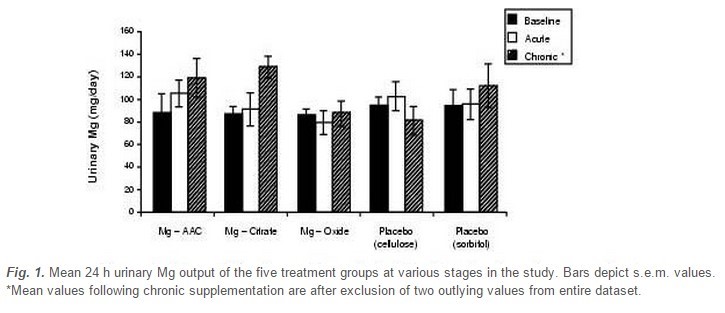
Mineral decrease from vegetables in the past century
Sums of averages of calcium, magnesium, and iron in cabbage, lettuce, tomatoes, and spinach.
copied from Healing Property of Minerals - Paul Bergner
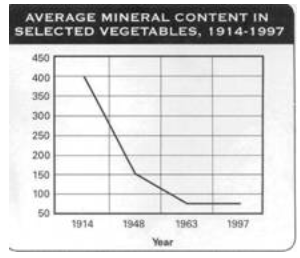
- - - - - - - - - - -
2004 Journal of the American College of Nutrition released a study which compared nutrient content of crops at that time with 1950 levels.
Average decline in Magnesium across fruits and vegetables studied21%
Spinach10%; Corn23; Carrots35%; Collard Greens84%
- - - - - - - - - - - - - - - - -
British Analysis of Mineral Content for Vegetables
from PDF which is attached at the bottom of this page
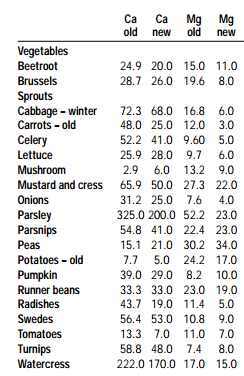
Note: column on the left = content circa 1960, on the right = content circa 1994
- - - - - - - - -
US Govt study of Mineral Content for a century did not change much
Seems to disagree with all of the other references
from PDF which is attached at the bottom of this page
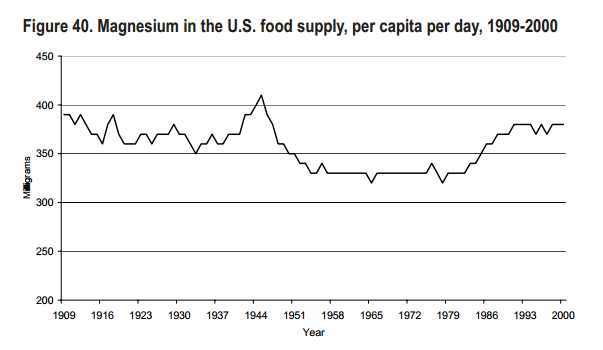
- - - - - - - - - - - - - - - -
Many great references - such as 1940-2002 in UK Magnesium
Milk down 21%; Parmesan cheese down 70%
- - - - - - - - - - - - - - - - - -
Clipped from Google inside book
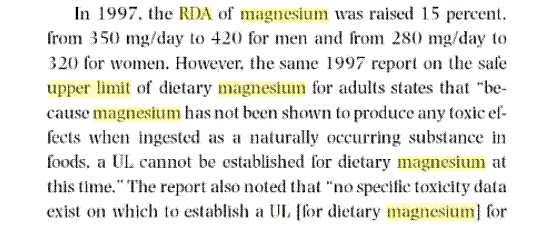
ADHD strongly assocated with Magnesium deficiency
Minerals imbalances influence learning disorders Natural Health 365
84% of kids with ADHD had significantly lower levels of iron compared to only 18% of control group
My notes of the book Magnesium Miracle by C. Dean, 2007 which need to be confirmed
Paul Mason summarized the WHO 2006 conference on Calcium and Magnesium in Drinking Water as:
1) There is a consensus that most of the world is deficient
Agreed that there are only 4 ways of increasing Magnesium and Calcium
2A) Have everyone on earth take pills which has never been done before,
unlikely on a global level. But practical on an individual level
2B) Advise everyone on earth to get better food.
Again unlikely globally, but practical for individuals
2C) Add Calcium and Magnesium to tap water.
Very wasteful as 99% of tap water is not used for drinking
Calcium can also build up as scale
2D) Require bottlers to add optimal calcium and magnesium to bottled products
(hoped that this would be done in 2008, but it looks like no action was taken)
WHO 2009: mentions water softeners and reverse osmosis systems remove all Magnesium and Calcium. Also that reverse osmosis systems add Sodium.
Pg xvii Magnesium regulates more than 325 enzymes in the body and orchestrates electric current in the nerves (along with Calcium)
Pg xvii Dietary Magnesium had been 500 mg/day in 1900 and barely 200 mg in 1990
Pg xix has 21 diseases associated with Magnesium deficiency some of which are also associated with Vitamin D deficiency (example: Asthma, Diabetes, Fatigue, Heart Disease, hypertension, kidney disease, back pain, fibromyalgia, Osteoporosis, and tooth decay). 68 Symptoms of Magnesium deficiency are listed in section: Who is Deficient
The Body is Electric. There is 10,000X as much Magnesium in the cell as Calcium. And Magnesium limits how much Calcium can get into a cell (which is the reason for many of the diseases associated with Magnesium deficiency the problem is not having too little Magnesium, but getting too much Calcium into cells)
60-65% of Magnesium is in the bones Blood has only 1% of the Magnesium (vs 99% of the Calcium is in bones)
Dead Soil Potash which has been used for fertilizer since the 1930s is more easily taken up by plants than magnesium or calcium. There typically is Magnesium in soils which have been used/abused for a long time. It also is leached out by rain water, especially from acid rains. If a soil is determined to be too acid lime is tyically added, which again reduces the Magnesium.
Processed Food Lacks Magnesium Refining flour 80% lost, Polishing rice 83% lost, Production of starch from corn 97% lost, Extraction of white sugar from molasses 99% lost
Fluoridated Water Banishes Magnesium Fluoride binds the magnesium, making it insoluble and it makes bones brittle.
Stomach Acid is Essential for Magnesium Absorption A big problem for people such as the elderly who are deficient in stomach acid.
Absorption of Dietary Magnesium Is Hindered A healthy body nicely sluffs off any excess magnesium. Our body was not evolved to store magnesium as it had always been readily available in foods. Problems with magnesium absorption include diseased intestines, low parathyroid hormone, amount of calcium, phosphorus, potassium (wonder about vitamin D), sodium, lactose, and iron. If take iron, take hours apart from when take magnesium.
Magnesium is blocked by certain foods High protein, spinach, chard, un-fermented soy,
Drugs cause magnesium deficiency diuretics, bronchodilators, birth control pills, insulin, digitalis, insulin, tetracycline, Corticosteroids, Nicotine, cisplatin (cheomtherapy)
Vitamin and Mineral Interactions with Magnesium Sufficient vitamin D is necessary for the ody to utilize magnesium (wonder how much sufficient is)
Heart Attacks 7 clinical studies has shown that 5-10 grams of intravenous magnesium reduced the risk of death by 55% after acute heart attack.
PMS reduced with 400 mg of Magnesium. Recommend taking 50 mg of B6 to assist in magnesium absorption.
Chocolate craving is a sure sign of magnesium deficiency. Chocolate has the most magnesium of any food.
Magnesium is just as important as calcium to prevent and treat osteoporosis
Magnesium keeps calcium dissolved in the blood so it will not form kidney stones
Magnesium deficiency is common in chronic fatigue syndrome and fibromyalgia sufferers
Magnesium deficiency may be an independent predictor of diabetes
Diabetics both need more magnesium and loose more than most people.
Magnesium acts as a natural statin
Magnesium reduces lactic acid, which causes post-exercise pain
Magnesium is lost during exercise
Magnesium deficiency may cause sudden cardiac death in healthy athletes
Magnesium and calcium deficiency may be a cause of growing pains in children
Magnesium deficiency can produce symptoms of anxiety or depression
Author takes about 7 pages to describe Magnesium tests. Apparently very little of the bodys Magnesium is in the blood serum, and it is tightly regulated except that when under stress the body adds more Magnesium to the blood. It appears that tests for Magnesium which test the serum are misleading, and white and red blood cell tests are an OK indication of blood in the cells of the body, unless the body is under stress such as an asthma attack. A better test is a EXATest which measures the amount of Magnesium in the mouth. The best test is a blood ionized magnesium test which, at the time of the book, was available only to researchers
Concerning vitamin D and Magnesium interaction from Internet:
- - - - -
Magnesium Dosage 3-4.5 mg/lb of body weight (element) = 600-900 mg for a 200 lb person. Some researchers recommend 40% more for children and athletes.
Supplement - how much in 500 mg
CLICK HERE for a forum discussion of Magnesium bioavailablity
Magnesium Sulfate -> Elemental Mag = 10%, Bioavailability = ?
Magnesium Chloride -> Elemental Mag = 12%, Bioavailability = ?
Magnesium Oxide -> Elemental Mag = 60%, Bioavailability = 4%
Magnesium Carbonate -> Elemental Mag = 45%, Bioavailability = 30%
Magnesium Hydroxide -> Elemental Mag = 42%, Bioavailability = ?
Magnesium Citrate -> Elemental Mag = 16%, Bioavailability = 90%
Magnesium Lactate _> Elemental Mag = 12%, Bioavailability = 99%
Magnesium Glycinate -> Elemental Mag = 18%, Bioavailability = 80%
Magnesium Malate -> Elemental Mag = 6.5%, Bioavailability = ?
Magnesium Taurate -> Elemental Mag = 9%, Bioavailability = ?
__Another person on the same made the following calculation of elemental Mg
MgSO4 -> 20.19% (but did not consider that it has 7 waters of hydration", so it's really MgSO4.7H2O)
MgCl2 -> 25.53%
MgO -> 60.30%
MgCO3 -> 28.83%
Mg(OH)2 -> 41.68%
Mg cit. -> 16.16%
Mg lac. -> 12.01%
Mg mal.-> 15.54%
Pico-Ionic Magnesium Bioavailability (claimed)= 100% with no intestinal upset {Update Fall 2012}
4 ml per day, no laxative affect even if have IBS-diarrhea, Crohns or colitis, $30
(Magnesium Bioavailability - 2005)
The Magnesium Factor - another book
Mentions magnesium reducing blood pressure in table 3.1 on page 55.
No change in blood pressure when taking just 360 mg, but drop of blood pressure for 500-1000 mg
Reuters June 2011Magnesium Deficiency Reduces Effectiveness of Vitamin D in the Prevention of Disease
According to Magnesium Expert Dr. Carolyn Dean, MD, ND
The journal Magnesium Research published a number of studies with the following findings:
- Magnesium is essential for the metabolism of vitamin D.
- Magnesium influences the body's utilization of vitamin D by activating cellular enzyme activity.
- A 32-page guide to the benefits of magnesium, along with magnesium deficiency symptoms, written by Dr. Dean, is available as a free download at http://www.nutritionalmagnesium.org.
Most people are Magnesium Deficient
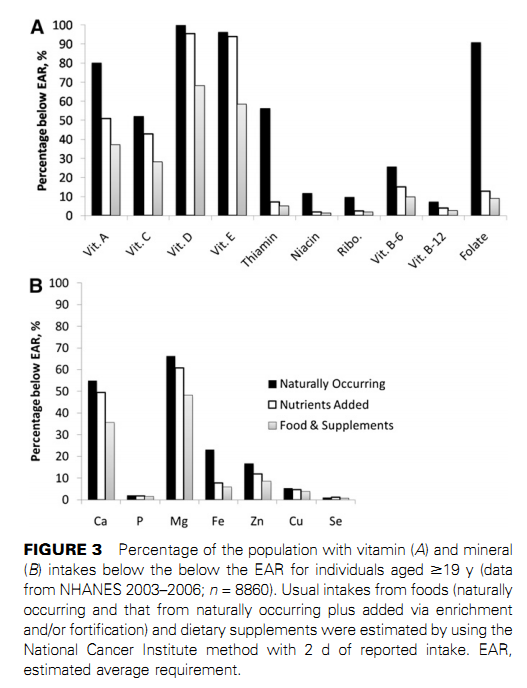
from Most people not getting enough Vitamin D, Magnesium, and Vitamin E Aug 2011
- - - - - - - - - - - - - - - -
Magnesium in water is associated with reduction in stroke
100 mg more Magnesium in water associated with 8 percent reduction in stroke Feb 2012
Independent evidence shows that Vitamin D and Magnesium both reduce strokes.
Expect that they would do well together - perhaps more than 2X the benefit
- - - - - - -
Magnesium Chloride
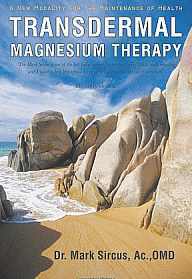
Book updated Nov 2013 not on Amazon as of Sept 2014

10 new chapters since July 2011
Perhaps good absorption directly through the skin
Magnesium in health In a few words
Magnesium in biochemistry a vital necessity, magnesiums effect, magnesium and women, magnesium and men, Magnesium in medicine. Ocean Frost
Magnesium compounds magnesium bromide, magnesium carbonate, magnesium chloride, magnesium citrate, magnesium hydroxide, magnesium oxide, magnesium phosphate, magnesium sulphate
Magnesium in water magnesium in drinking water, magnesium in hard water
Magnesium in food dietary requirements, diets and diabetes, health risks, magnesium deficiency, recommended amounts, supplements
Supplementation
Articles ageing, aggressive behavior, alcoholism, arrhythmia, asthma, autism, cancer, cramps
diabetes, heart-related, hypertension, kidney-stones, menopause, migraine-headache, osteoporosis
sport-related, stress, tetanus, toxic-shock, violence
General conclusions
Magnesium Interactions

From Transdermal Magnesium (Ancient Minerals) Dec 2012
The only difference between chlorophyll and hemoglobin is that Magnesium is in the center instead of Iron

huge web page

Magnesium is one of the treatments for Restless Legs
Natural Ways to Eliminate Restless Leg Syndrome Symptoms & Enjoy Long Lasting Relief
By Leanne Purdie. Copyright 2013; Ebook is attached at the bottom of this page
European upper limit for Magnesium was based on diarrhea
PDF is attached at the bottom of this page
See also web
- Learn More About How Important Magnesium Is 2005
"For example, magnesium was first shown to be of value in the treatment of cardiac arrhythmias in 1935."
" More than seventy years later, there are now numerous double-blind studies showing magnesium to be of benefit for many types of arrhythmias including
atrial fibrillation, ventricular premature contractions, ventricular tachycardia, and severe ventricular arrhythmias"
"The arrhythmia burden of the patient with CKD is high, with the single greatest contributor to mortality in end stage renal disease (ESRD) being sudden cardiac death (SCD)" - Magnesium – its role in CKD. Nefrologia, May 2013, full text online
Magnesium for treatment of hyperphosphataemia in patients with chronic kidney disease - Arrhythmias Life Extension date unknown - perhaps 2011
"Food, drugs, and medications. Coffee, tea, chocolate, red wine, or simply overeating may cause rapid heartbeats that may be frightening when felt but are rarely serious"
"Both magnesium and potassium are intricately involved in the hearts electrical stability (Cybulski J et al 2004); consequently, maintaining normal functional blood levels and ratios of each is important" - Is Magnesium Toxic? No! Dr. Carolyn Dean on contraindications (when to not take Magnesium) Dec 2012
Kidney failure, Myasthenia gravis, Excessively slow heart rate, Bowel obstruction - Nutrional Magnesium Association Which has the following coverage


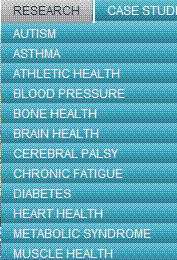

Chart shows 3 locations where low Magnesium decreases Vitamin D
Vitamin D reduced so low that Victorian age diseases are returning

Magnesium may not be as available if have low stomach acid (seniors)
Magnesium may not be as available if have low stomach acid (seniors) has the following chart of stomach acid vs age
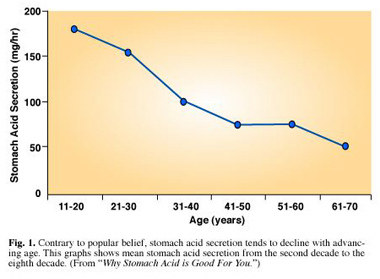
See also Calcitriol, not inactive vitamin D, associated with pain in seniors Aug 2014
Low Magnesium ==> low Calcitriol (the Vitamin D which actually gets to the cells)
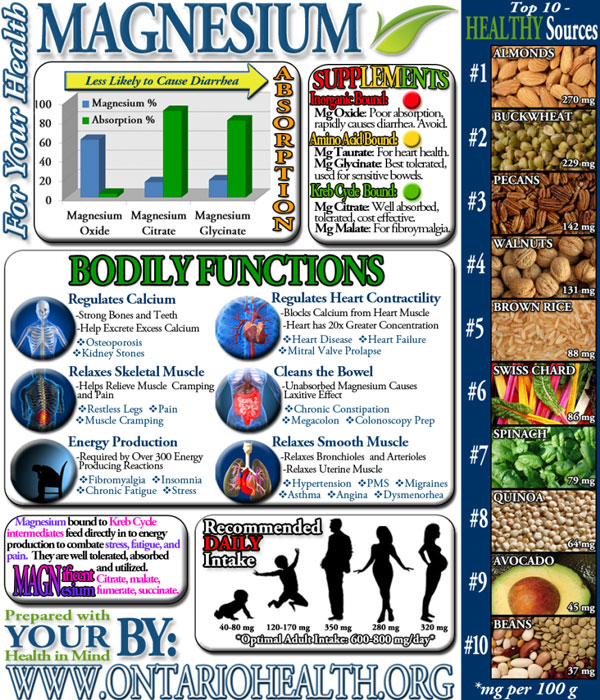
Magnesium test of your blood $49
Much more heart disease if Calcium/Magnesium ratio is too high
George Eby
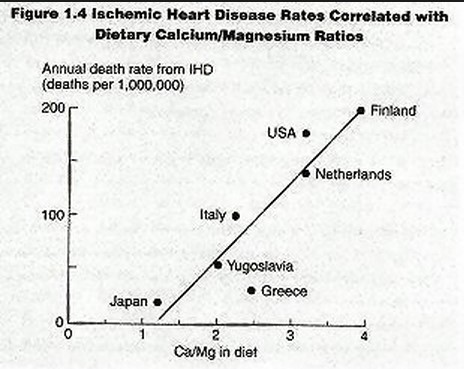
Takes 54 molecules of Magnesium to process one molecule of sugar

Cost of food to get 400 mg Magnesium
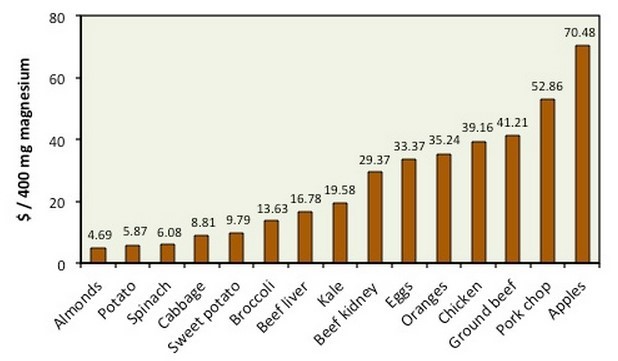
Notes on what needs to be changed here (May 2013)
Summarize Mg: Body knows how to get rid of too much at one time,
Many forms vastly different amount get into body
important to 20+ health conditions such as bone
Synergistic with Vitamin D they help each other
Can also get Mg through skin: Epson Salt foot bath
Far less Mg in food in past 40 years
Many drugs a
nd chemicals which also reduce Magnesium in body
Suspect also that need more Mg as have more Vitamin D
Increase Mg to at least 500, decrease Ca to <500 perhaps zero
Magnesium Chloride pill , liquid, cream
Pico Mg apparently no side affects 48 of 300 mg for $30
vs 32 of 300 for $18 Mg Chloride
Mg vs Fe = Chlorophyll vs Hemoglobin
Mg/Heart analysis
More people are deficient?, many similar recent reasons,
Widespread health, Deficiency not associated with specific problem
Mag decreased: furt (see chart in Mag page), refined foods,
high fat diet, salt, less hard water, transdermal
Calcium supplementation, boiling veg, coffee, diuretics,
impaired absorption such as Crohn's disease, unhealthy kidney
diabetes, 30% to 60% of alcoholics, fluoridation?
magnesium absorb decreases and +renal excretion in seniors
Potash is more easily taken up by plants than mag or calcium.
Mg overdose only if dialysis (Kidney not working)
Mg: Pico, attach PDF, 100% nothing for laxative,
just 1/4 teaspoon twice a day for 14 days
http://www.amazon.com/Invisible-Minerals-Magnesium-Pico-Ionic-ebook/dp/B009V2ZJZ4 $4.00
Pico: The Pico-Ionic form is 50,000 ppm and comes in 8oz. bottles at an average daily dosage of 250mg per 4mls (1 tsp = 5 ml)
http://www.amazon.com/Liquid-Ionic-Minerals-Magnesium-250mg/dp/B005PFK3YS/ref=pd_sbs_hpc_1 half price
Liguid Magnesium from Mother Earth Minerals is extremely dilluted and should be ignored
only 10 milligrams of Mg per teaspoon.
Candida may interfere with absorption of Magnesium in the gut
Comment from the web March 2015
If true. probabaly want to emphasize transdermal Magnesium
Need to investigate
% Magnesium element in supplements
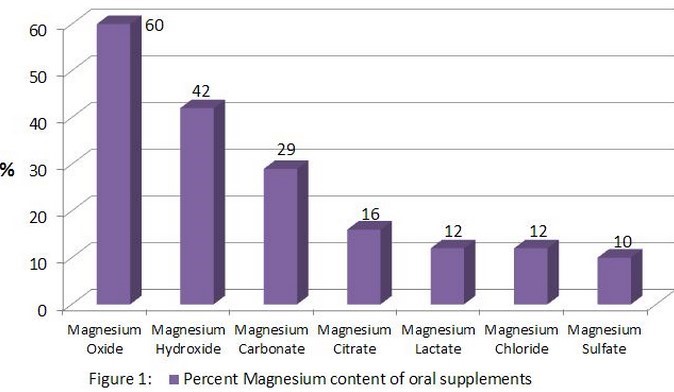
http://ods.od.nih.gov/images/factsheets/magnesium.figure1.jpg
Person running the Magnesium Deficiency Facebook page believed: no benefit to > 20 ng of vitamin D
I had posted a comment about Mg/Vitamin D interaction March 2015
He did not want to Facebook people to be aware of such heresy.
He reprimanded me
So I resigned from the group. - Henry Lahore
Here is his webpage on Mg/vitamin d
Short url = http://is.gd/VDMag
